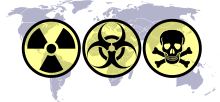The Socialist Federal Republic of Yugoslavia began its own nuclear weapons program in the early 1950s, amid rising tensions with the Soviet Union during the Informbiro period. Yugoslavian leader Josip Broz Tito decided that the development of nuclear technology was in the country's best interest as deterrence from a possible invasion and in order to protect the country's sovereignty.
Nuclear weapons
To protect Yugoslavia's national sovereignty and gain international status, the regime of Josip Broz Tito began a nuclear weapons program in the early 1950s. Yugoslavia would later sign the Non-Proliferation Treaty, which caused the program to shut down. Another nuclear weapons program was started after India tested their nuclear weapons on May 18, 1974. This program would eventually shut down in 1987, but Yugoslavia (and eventually the Republic of Serbia) kept high grade enriched uranium until 2010, where they then gave their uranium to the Russian Federation.
Chemical weapons
Before the Yugoslavian breakup and the Yugoslav Wars, the Yugoslavian government was able to develop and store several different types of chemical weapons such as mustard gas, sarin agent and blister agents. Mustard gas was prepared and installed at the Prva Iski factory in the town of Baric.
Missile program
The Yugoslavian government allegedly worked with Libya and Iraq to develop missiles, cruise missiles and anti-naval/land attack missiles capable of carrying weapons of mass destruction and conventional warheads. Serbia is currently the only former Yugoslav member with a missile program.
Alleged use in the Yugoslav Wars
During the Yugoslav Wars, the Yugoslav Army (Federal Republic of Yugoslavia) allegedly used chemical weapons in combat against Bosnian and Croat separatists. Chemical weapons were not confirmed to have been used in the Yugoslav wars by either sides.
See also
- Armijska Ratna Komanda D-0, a Yugoslav nuclear bunker
References
- ^ "Former Yugoslavia Overview". Nuclear Threat Initiative.
- "Tito's Nuclear Legacy". James Martin Center for Nonproliferation Studies. March 14, 2000.
- "Former Yugoslavia Chemical Overview". Nuclear Threat Initiative.
- "Special Weapons Facilities - Serbia". nuke.fas.org.
- "Arming Saddam: The Yugoslav Connection". www.crisisgroup.org. December 3, 2002.
- Plavsić, F.; Petrovecki, M.; Fuchs, R.; Sostarić, B.; Wolf-Coporda, A.; Romić, Z.; Ivanić, D.; Mijatović, I.; Ivicić, N. (August 16, 1992). "[The chemical war in Croatia]". Lijecnicki Vjesnik. 114 (1–4): 1–5. PMID 1343014 – via PubMed.
- "Poison Gas: The Bosnian War's Forgotten Weapon". Balkan Insight.
